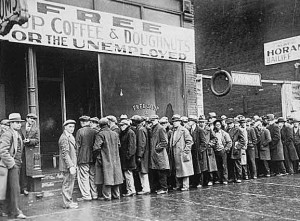
The Old Mole Variety Hour
April 25, 2011
A few days ago, I received an email from MoveOn.org that read:
Dear MoveOn member,
There's a youth jobs crisis in America that no one is talking about.
Students and graduates are taking matters into their own hands to show that they're ready for work—but the jobs just aren't there. They want Congress to do its job by focusing on job creation.
All around the country, they're organizing themselves into "Briefcase Brigades." Next Wednesday, April 27, students and graduates will head to their representatives' offices, in full business attire, with resume and briefcase in hand, to show that they're ready and waiting for jobs.
Of course it’s not only new college graduates for whom there are not enough jobs. According to the Economic Policy Institute,
job openings remain 32% below where they were in 2007, and they are still below even the worst month of the early 2000s downturn.
… February marks 26 months that the “job-seeker’s ratio” has been substantially above the 4-to-1 ratio. A job seeker’s ratio of 4-to-1 means that for 3 out of 4 unemployed workers, there simply are no jobs.
Most politicians these days name job creation as their highest priority, though one might wonder whether our mostly very wealthy leaders feel the pain of unemployment enough to take concerted action. But this phrase job creation raises some questions worth exploring. So let’s set aside for the moment the issues about how to create jobs, and ask instead who creates jobs and what is a job?
Who has the power to create jobs and what gives them that power? Most people think jobs should be created in the private sector, and if government spending is required, it should somehow stimulate private businesses to hire more workers. But there is a less obvious assumption in the way the issue is framed: We are told that employers are laying off workers, or they are not hiring. And then the question is posed, What can we do to reverse this? But what should raise a red flag here is the unquestioned agreement that there is a class of people and institutions whose prerogative it is to decide whether there are to be jobs or no jobs. It is these “employers”, owners of capital, who must be enticed into “creating” jobs. It is their interests, the interest of capital in generating maximum profits, that must be served if people are to be able to make a living. Unless the interests of the owners and managers of capital can be satisfied, we cannot do the work that needs to be done.
And yet surely it is a matter of common interest that there should be jobs, that the work that needs to be done gets done. Why is it up to a special interest, namely the very wealthiest among us, to decide whether millions of people can put food on the table or keep their homes or get good health care? As long as we do not see and continue to accept this assumption, that wealthy investors have the right to turn off the life-giving spigot of productive labor whenever it suits them, that they have every right to let their riches idle uselessly in tax havens or stock market games, we citizens are left in the position of having to beg our de facto rulers to let us employ our skills and muscles to meet our common needs. Of course begging will get us no where: we have to bribe them with tax breaks, big profit margins, subsidies, and deregulation –– and even then, they may find more profitable or more secure ways of making their money pay.
Another question we must ask is what is a job? Progressives are out on the streets demanding jobs. But can we imagine something better than jobs we could be organizing for? When we demand jobs, we are asking for positions of subordination, to be put to work, generating profits for the employer (at least in the private sector), to create more value than the value of the wages he has to pay us and his other costs of doing business. We leave it up to the employer to direct our labor into whatever channels will net him the profit his capital demands. Once we have a job, our work transforms the world, it releases products and services into the world which affect everyone’s lives, whether it’s an air polluting power mower, a super sized soft drink, a semi-automatic assault rifle, or a payday loan at 400 percent annual interest. When we take a job, we become a tool of capital.
What if, instead of asking employers, or the government, for jobs, we asked ourselves what needs to be done and what we want to do? What if we asked ourselves, how do we want to live and what do we need to do in the world to make that possible? How can we arrange things, transform things, so that we can create and recreate ourselves, rather than subordinating ourselves and our creative powers to those who have just one goal: to get richer than they already are – and to stay in control of everything so they can prevent us from asking such questions.
We will not be able bring down the current system until we learn to see it for what it is: a system in which we must all dedicate most of our lives to the enrichment of the already rich. In this world, we do have to support job creation. But what we really need to create is another world where we can build and live in our common world in service to each other and ourselves.
I’m Clayton Morgareidge for the Old Mole Variety Hour


